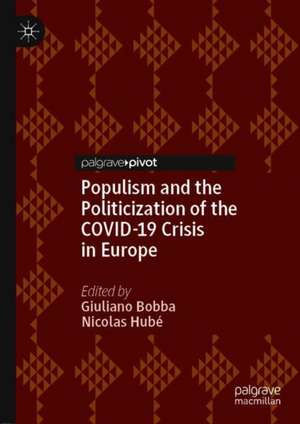Populism and the Politicization of the COVID-19 Crisis in Europe
Editat de Giuliano Bobba, Nicolas Hubéen Limba Engleză Hardback – 3 mar 2021
Preț: 484.69 lei
Nou
Puncte Express: 727
Preț estimativ în valută:
92.76€ • 95.82$ • 77.20£
92.76€ • 95.82$ • 77.20£
Carte tipărită la comandă
Livrare economică 26 martie-09 aprilie
Preluare comenzi: 021 569.72.76
Specificații
ISBN-13: 9783030660109
ISBN-10: 3030660109
Pagini: 144
Ilustrații: XVI, 144 p. 12 illus., 10 illus. in color.
Dimensiuni: 148 x 210 mm
Greutate: 0.35 kg
Ediția:1st ed. 2021
Editura: Springer International Publishing
Colecția Palgrave Macmillan
Locul publicării:Cham, Switzerland
ISBN-10: 3030660109
Pagini: 144
Ilustrații: XVI, 144 p. 12 illus., 10 illus. in color.
Dimensiuni: 148 x 210 mm
Greutate: 0.35 kg
Ediția:1st ed. 2021
Editura: Springer International Publishing
Colecția Palgrave Macmillan
Locul publicării:Cham, Switzerland
Cuprins
1.COVID-19 and Populism: A Sui Generis Crisis.- 2.UK: Between managed moderation and far-right conspiracy theories.- 3.Spain: Is ideology back in populist discourse?.- 4.Italy: Populist in the mirror, (de)politicizing the COVID-19 from government and opposition.- 5.France: Governmental unpreparedness as a discursive opportunity for populists.- 6.Germany: The AfD’s Staggering between Reason and Resistance.- 7.Hungary: Crisis as usual - Populist governance and the pandemic.- 8.Czech Republic: Running the State like a Family Business.- 9.Poland:‘If we don't elect the President, the country will plunge into chaos’.- 10.Between mitigation and dramatization:The effect of the COVID-19 crisis on populists’ discourses and strategies.
Recenzii
“Populism and the Politicization of the COVID-19 Crisis in Europe is a successful discourse analysis of populist parties. The authors’ clean organization of these exceedingly difficult and intersecting cases can serve as a useful and trustworthy guide for scholars studying different strategies of right- and left-wing populist parties … . Along with its scholarly value, the book will be of considerable interestto anybody curious about the populist parties and their reactions in a time of worldwide turmoil.” (Alper Çakmak, Insight Turkey, Vol. 24 (1), 2022)
Notă biografică
Giuliano Bobba is Associate Professor in the Department of Cultures, Politics and Society and Affiliate at the Collegio Carlo Alberto, University of Turin, Italy.
Nicolas Hubé is Professor in the Centre de Recherche sur les Médiations, University of Lorraine, France.
Nicolas Hubé is Professor in the Centre de Recherche sur les Médiations, University of Lorraine, France.
Textul de pe ultima copertă
This edited book provides a first overview of how populist parties responded to the COVID-19 pandemic crisis in Europe. Although populism would normally benefit from crisis situations (e.g., political representation or economic crises), the peculiar nature of this health crisis does not make the benefit obvious. For it to be exploited, a crisis must be politicized. While populists have tried to take advantage of the crisis situation, the impossibility of taking ownership of the COVID-19 issue has made the crisis hard to be exploited. In particular, populists in power have tried to depoliticize the pandemic, whereas radical right-populists in opposition tried to politicize the crisis, though failing to gain the relevant public support. This book considers populist parties in eight European democracies, providing a framework of analysis for their responses to the COVID-19 crisis. It does so by engaging with the literature on crisis and populism from a theoretical perspective and throughthe lens of the politicization process.
Giuliano Bobba is Associate Professor in the Department of Cultures, Politics and Society and Affiliate at the Collegio Carlo Alberto, University of Turin, Italy
Nicolas Hubé is Professor in the Centre de Recherche sur les Médiations, University of Lorraine, France.
Nicolas Hubé is Professor in the Centre de Recherche sur les Médiations, University of Lorraine, France.
Caracteristici
Identifies the main features of populist action by focusing on the leaders’ statements and political initiatives Contributes to crisis and populism literatures defining patterns among different types of populism Offers an empirically grounded overview of the topic through eight country cases
